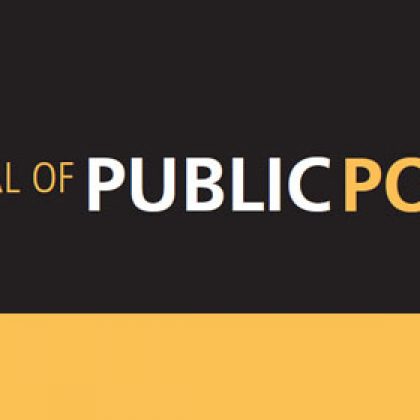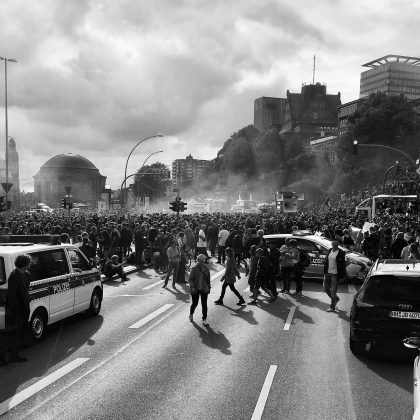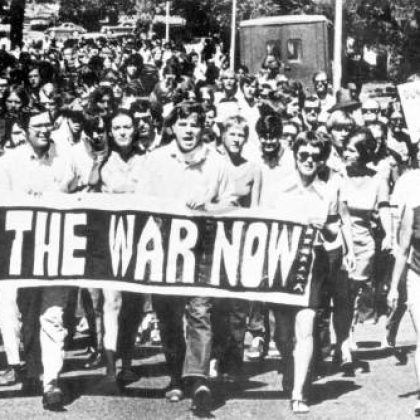SPS: Call for Themed Section Proposals
Social Policy and Society published a uniquely structured themed section in each issue which is designed to offer an overview of a particular policy-relevant theme.…

Social Policy and Society published a uniquely structured themed section in each issue which is designed to offer an overview of a particular policy-relevant theme.…

Frederick Douglass said: “Once you learn to read you will be free.” On this World Book Day (7 March, 2024) Cambridge hopes to help spark that enquiry.…

In 2005, pharmacies in Greece and Portugal enjoyed some of the highest regulatory protections from competition in the EU. Fifteen-plus years later, Greek pharmacies are still highly protected, while Portuguese pharmacies have had to undergo several bouts of liberalization.…

The Roman Catholic Church has, in most historical and theological analyses, had a rather hostile relationship to liberal modernity, despite the fact that the church helped to produce the modern world and the thought patterns that continue to govern it.

In this Conversation with Authors, we spoke with Dr. Emma Saunders-Hastings about her recent APSR article, “‘Send Back the Bloodstained Money’: Frederick Douglass on Tainted Gifts.”…

In this Conversation with Authors, we spoke with Dr. Roberto Carlos about his recent APSR article, “The Politics of the Mundane.”…

In this post, Phillip Ayoub (PA), Douglas Page (DP), and Sam Whitt (SW) discuss their APSR article, “Pride amid Prejudice: The Influence of LGBT+ Activism in a Socially Conservative Society.”…

The proposed European Super League for football might have stalled at its inception but it is unlikely to be the last we hear of the idea, in this or any other sport.…

Do governing parties follow through on their campaign promises? Representative democracy requires that there are policy linkages between citizens and policies ultimately enacted by their governments.…

In a recent article in the APSR, Katerina Linos, Laura Jákli, and Melissa Carlson partnered with a Greek NGO to conduct a cutting edge text message donation experiment.…

This post first appeared on Jonathan Havercroft’s blog in January 2021. During the middle of the Stop the Steal riot on Wednesday, some commentators on social media argued that this showed how those who defended Black Lives Matter riots in the summer were wrong.…

Low-income mothers may feminize their children in the womb by adjusting their hormones, whereas high-income mothers may masculinize their children, a major study based on finger length, led by a Swansea University expert, has found.…

For this post, we asked Dr. Jamil Scott to speak with Dr. Tabitha Bonilla and Dr. Alvin Tillery about their APSR article, “Which Identity Frames Boost Support for and Mobilization in the #BlackLivesMatter Movement?…

Once again, a brutal rape case that occurred in India in September 2020 has captured headlines and stunned the world. In Hathra, Uttar Pradesh, a Dalit (an oppressed caste), woman was gang-raped by several dominant caste men; she succumbed to her injuries two weeks after the attack.…

Cambridge University Press is excited to announce the launch of a new peer-reviewed, Gold Open Access journal for 2022. Memory, Mind & Media will be an agenda-setting interdisciplinary journal that explores the impact of media and technology on human, social and cultural remembering and forgetting.…

This is the first post in our new series: “Conversations with Authors.” For our inaugural post, we asked Dr. Vesla Weaver to meet (virtually) with Dr.…

Prior to the beginning of our tenure, we set out a vision statement for the APSR revolving around six principles. One of these principles is editorial transparency, specifically as it refers to sharing with our community information about our editorial workflow and characteristics of our authors, reviewers, and readership during our tenure.…

Drawing upon her article in the European Journal of International Security (EJIS), Laura J. Shepherd explores ‘The Paradox of Prevention in the Women, Peace and Security Agenda’.…

When 43 students disappeared in the Mexican city Iguala in September 2014 during an attack of a joint group made up of local mafia and municipal police forces, a public outcry plunged the government of President Enrique Peña Nieto into crisis and decisively contributed to the defeat of his PRI party in the presidential elections.…

**updated August 28, 2020** Elections for judges in the US don’t usually attract much controversy or attention, but the 2014 race for seats on the Montana Supreme Court was an exception.…

For decades, external observers have dismissed Belarus as a country with a weak or contested national identity and an underdeveloped civil society.…

The digital sphere is consistently expanding, and now encompasses more than half of the world’s population with eight billion digital devices (Kemp, 2019).…

Drawing upon their article in vol.5, no.2 of the European Journal of International Security, Aiko Holvikivi and Audrey Reeves explore how the Women, Peace and Security agenda has broadened to make space for women in conflict zones and also for refugee women in Europe’s borderlands.…

This summer has seen mobilization on an unprecedented scale, as people have taken to the streets to demand action against police violence and systemic anti-Black racism.…

On June 30th the Higher Education website initially launched with a small selection of 80 online textbooks, with more titles due to be added throughout the following months.…

In this post, John J. Heslen expands on his article in a recent issue of Politics and the Life Sciences.…

In this post Lawrie Balfour expands on her 2003 American Political Science Review article ‘Unreconstructed Democracy: W.E.B. DuBois and the Case for Reparations‘.…

Higher Education from Cambridge University Press is our new online textbook website, launched in August 2020. In recent months Cambridge University Press has introduced a new set of strategies to support changing teaching and learning needs as higher education institutions prepare for a more digitally driven future in the wake of pandemic.…

In this post Dean Knox, Will Lowe, and Jonathan Mummolo expand upon their APSR article ‘Administrative Records Mask Racially Biased Policing‘ which was recently published online.…

“I would like to be free, as a man is free. Like a man who needs to wander with his fantasies and who finds this space only in his democracy, that has the right to vote and spends his life delegating and in receiving commands has found his new freedom” (Giorgio Gaber, “la Libertà”, 1973) Delegation is a very common act in our everyday life: We delegate tasks to our colleagues in the workplace.…

We are honored to officially start our editorship of the American Political Science Review. We do so with great excitement, but also with some solemnity.…

Let’s face it – stepping (sitting) in front of a camera has become a staple component of working from home during the global pandemic.…

The world is currently facing the most serious health crisis in more than a century. While virtually all countries have been affected by the COVID-19 pandemic, there is some variation in the spread of the virus and the extent to which it has disrupted societies and economies.…

Many of us are discovering that working at home for a long stretch can be difficult. Staying productive and motivated is a challenge, and it is not always easy to find a routine to keep things running smoothly.…

On January 27, 2017, one week after his inauguration, President Trump signed the “Protecting the Nation from Foreign Terrorist Entry into the United States” executive order which indefinitely suspends the resettlement of Syrian refugees, temporarily bans people from seven majority-Muslim countries from entering the U.S.…

The hashtag #primariessowhite has been trending in reference to the all-white, mostly male candidate pool for the Democratic presidential nomination. Little discussed is the fact that the demographics of the potential candidates is the result of institutional processes and procedures that artificially inflate the importance of white, middle class voters and suppress the political influence of racial and ethnic minorities by making harder for candidates of color to secure nominations and win offices.…

Policy is often depicted as prescription –a set of rules by which services and functions are carried out in the public sphere.…

Among the many narratives about political ramifications of racial and ethnic demographic change in the United States over the last several decades, the potential of Latinx population growth to shift the nature of politics in the states, and even the calculus of Presidential campaigns, gained prominence as Latinx population growth seemed concentrated in what were long considered Republican strongholds.…

The accidental shooting of Kathryn Steinle in 2015 by Jose Inez Garcia Zarate, an undocumented immigrant, in San Francisco ignited a long-dormant debate on sanctuary cities.…

In the past three decades, credit rating agencies have been in the limelight on more than one occasion, and not in a good way.…

Are immigrants in the U.S. politically active? Do they vote, engage in political campaigns, and participate in protests as frequently as the native-born population?…

Central American migration is not a new phenomenon. While the contexts causing people to leave the region, primarily the Northern Triangle, have changed over time, they remain interconnected in that the historical “push factors” for migration out of Central America laid the foundations for the migratory flows we are seeing now.…

On 4th February Donald Trump delivered what may be his last State of the Union. He is facing a tough election later in the year and it comes as no surprise that his address was chock full of themes to get his base frothing at the mouth, among which was illegal immigration.…

Historically much of the literature on bureaucratic behavior seeks to better understand how bureaucrats will use their discretionary power and information advantages to make decisions.…

Morality policies involve a controversial question of first principles or core values. Does gambling belong to this category of policies?

After decades of value change towards more egalitarian gender norms across most Western societies, the trend has now slowed, and even reversed in some countries.…

One of the traditional assumptions of the debate over the ethical status of animals has long been that someone who is committed to reducing animal harm should not eat meat.…

Referencing his FirstView article for the European Journal of International Security (EJIS), Thorsten Wojczewski examines populism in contemporary politics and international relations.…

Referencing her article in the latest issue of the European Journal of International Security (EJIS), Elspeth Van Veeren blogs on the power of secrecy in security discourses.…

Based on her FirstView article in the European Journal of International Security (EJIS), Anna Danielsson reconceptualises the politics of knowledge authority in post/conflict interventions.…

In this post, Aaron C. Weinschenk expands on his and his co-authors’ article in a recent issue of Politics and the Life Sciences.…

Referencing his article in the latest issue of the European Journal of International Security, Professor Roland Bleiker examines how everyday aesthetic sensibilities can open up new ways of thinking about security dilemmas.…

Drawing upon original oral histories and reflective testimonies collected as part of the Mass Observation Project, my article explores the ways in which teenage girls’ friendship groups and extended network of classmates and peers shaped their sexual lives.

Throngs of young (and not so young) people refusing to pretend that the human race is not in the most serious crisis it has ever faced.…

The latest Paper of the Month for Parasitology is ‘Parasitological research in the molecular age‘ by Christian Selbach, Fátima Jorge, Eddy Dowle & Robert Poulin Technological developments often provide new tools for scientific advances.…

The killing of Solomon Tekah, an 18 year-old Ethiopian-Israeli, shot to death by a police officer, led to mass demonstrations. Young Israelis of Ethiopian descent voiced their frustrations and anger with what they described as racism and police brutality.…

Might work be interrupting a good night’s sleep? Modern societies are chronically sleep deprived. Many adults are sleeping less than the recommended 7–8 hours, in part due to the pressures of work.…

Discussions of Iran’s modern history are discussion about crisis. Since the outset of 20th century up until today, Iran went through two revolutions, two wars, successful and failed coups, international sanctions, and profound cultural and social transformations.…

Social welfare policies are among the most salient and potentially controversial policies today. In virtually all western democracies, public support for the social safety net has changed significantly over time.…

The importance of maternity and childcare entitlements has been widely acknowledged by both scholars and policy-makers: evidence shows that well paid, non-transferable and flexible provisions with respect to maternity and child care-giving mitigate the “baby penalty” women face in the labour market and help in reducing gender inequalities both in the household and at the workplace.…

Patients warned about the personal health risks of misusing medicine were almost twice as likely to heed the advice and take and it correctly, a new study has found.…

A recent study by RAND Corporation researchers examined the average amount of police spending on crimes for each state. Averaging the results across all states and considering where people live, the cost to respond to various crimes

Africa’s future is urban. By 2050, the majority of Africans will live in cities, transforming its societies and economies. Yet very little is known about the impact this demographic shift will have on residents and political systems.…

According to the mainstream literature related to governance change in higher education (HE),Western European governments have redesigned governance systems to make HE institutions more accountable by turning to a similar policy formula (the so-called ‘steering at a distance’ governance arrangement).…

With teachers on strike in Los Angeles and airport workers on strike in Berlin, early 2019 already looks set to be a notable year for labor actions in Europe and the United States.…

The 2015 defeat of the People’s Democratic Party (PDP) at the polls was Nigeria’s first “electoral turnover,” giving us a new narrative for the decline of dominant parties.…

Unified control of policymaking by a single political party is perhaps necessary, but not sufficient for observing policy outcomes consistent with majoritarian policy preferences.…

Sven Steinmo states in his book Taxation and Democracy, “Governments need money. Modern Governments need lots of money.” This is no less true today than it was twenty-five years ago when he wrote it.…

In democratic countries, actors inside and outside the state have various channels for expressing their concerns and influencing policy agendas. In contrast, in authoritarian countries, less inclusive institutions lead to different dynamics of policy change.…

The 50 American state governments have been faced with many questions related to healthcare and immigration in the past two decades.…

Women are running for U.S. public office in record numbers, offering hopes of seriously tackling the gender gap in political representation.…

Currently, policymaking is torn between two demands. On the one hand, issues become increasingly complex, calling for the incorporation of expertise in the policymaking process and increasingly complex decision-making procedures.…

This blog accompanies the Forum on Academic Freedom published in History of Education Quarterly. In the past decade or so, there has been an uptick in assaults on academic freedom across the globe. …

When the History of Education Quarterly asked me to contribute to a symposium on academic freedom, I could hardly refuse. I had recently written a book about how anti-communist witch hunters in the late 1940s and 1950s attacked teachers and professors, and about the Supreme Court’s eventual (and much-belated) response in 1967–striking down a typical state loyalty law and announcing that academic freedom is a “a special concern of the First Amendment, which does not tolerate laws that cast a pall of orthodoxy over the classroom.”…

Significant health inequities persist between Aboriginal and Torres Strait Islander people and non-Indigenous Australians, resulting from the past and continuing impacts of colonisation and contemporary social, economic and cultural inequalities.…

Despite a near unanimous agreement that human trafficking is a morally reprehensible practice, there is confusion around what qualifies as human trafficking in the United States.…

A seismic shift is going on in finance still largely unnoticed by the public. People and institutions are increasingly investing their money into index tracker funds instead of actively managed mutual funds.…

Over a decade ago I attended a meeting in London with senior Iranian foreign ministry officials discussing prospects for a resolution of the burgeoning crisis over Iran’s nuclear programme.…

This article tells the history of the midlife crisis, for the first time. The term “midlife crisis” conjures up the image of an affluent, middle-aged man speeding off in a red sports car with a woman half his age.…

Since the early 2000s successive Australian governments have required single parents with school age children who are in receipt of income support payments to at a minimum engage in some form of planning to return to paid work or part-time paid work or education/training.…

This post by R. Michael Alvarez originally appeared on PS:Now on April 10, 2018. Research transparency and replication are important issues today in the quantitative social sciences.…

In an article initially drafted a year ago and now published in a themed section of Social Policy and Society, we attempt to assess the past and future development of EU and UK social policy in the context of Brexit.…

Dr Rachel Heinrichsmeier from King’s College London reports on a practice used by older women in her research in a hair-salon.…

In the United Kingdom and across the European Union, Brexit continues to be the key social, political and economic issue of the day.…

My book, Framed: Media and the Coverage of Race in Canadian Politics, is wake-up call for those who think that race does not matter in Canada.…

In 2013, the proportion of benefit claimants being sanctioned reached record levels. Over 6% of jobseekers were having their out-of-work benefit payments stopped each month for a minimum of four weeks, and many more were going without payment while their decisions were under appeal.…

The contribution of unpaid work, often performed by women, is and has been largely unrecognised, a situation feminist scholars have long drawn to our attention.…

Irrespective of moral and political arguments, current fiscal restraints in the English National Health Service (NHS) make decommissioning apparently unavoidable. Decommissioning – that is the removal, relocation or replacement of treatments and services – is being pursued by health care planners in response to the need to balance budgets, but has also been advocated by exponents of evidence based medicine on quality grounds (Hurley, 2014; Malhotra et al, 2015).…

Since the Brexit referendum the UK government has been criticised for failing to recognise the positions and concerns of the devolved governments.…

In this post, Anne Peters gives us an overview of the Symposium on Global Animal Law: Animals Matter in International Law and International Law Matters for Animals that is now published open access by AJIL Unbound.…

Now that the new academic year has arrived, many Ph.D. students will be going on the job market for the first time.…

If you teach in a sociology program, you have no doubt heard of teaching through active learning. Most college instructors now know that students learn more and perform better when actively engaged in (and out) of the classroom (Bajak 2014, Killian and Bastas 2015).…

Leaving the EU would free up more money for the NHS, according to Leave campaigners. This pledge has been all but disowned – and in any case, writes Joan Costa Font, Brexit will impose further costs on an already cash-strapped service. …

I am delighted to announce a new editorial team for JEPS, which will hit the ground running after APSA. We will have seven associate editors and a senior associate editor.…

The role of regulation in saving lives, enhancing public health and welfare, and protecting the environment rarely features in policy debates in the UK.…

As many commentators have pointed out, the UK welfare state faces long-term structural problems in two main areas. Globalisation and technological changes demand that government directs attention to national competitiveness, and population ageing requires more spending on pensions, health and social care.…

With Brexit negotiations underway, a key question is whether withdrawal from the EU will affect equality policies. The Fawcett Society has recently warned that Government ‘Great Repeal Bill’ will present ‘a real threat to our equality laws’ in so far as it risks ‘weakening of protections’.…

It happens to all academic researchers, all of the time. We have to deal with rejection – our papers get rejected for publication by journals.…

In this post, the guest Editors of the latest 50th anniversary issue of the Canadian Journal of Political Science / Revue canadienne de science politique, Alexandra Dobrowolsky, Fiona MacDonald, Tracey Raney, Cheryl N.…

This article just published in JSP is a direct challenge to official and mainstream social policy orthodoxy on the issue of ageing which focuses on old age, not ageing, and assumes that later life is a natural period of decline. …